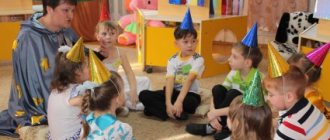Definition 1
The preschool education system is a complex of educational institutions, training programs, management frameworks, patterns and principles for the implementation of educational activities at the preschool age stage of personality development.
The preschool education system plays a key role in the development of the personalities of the younger generation. Therefore, careful organization of training at this level and the construction of an optimal system focused on the implementation of the concept of education at the current stage of development of the social environment and meeting the needs of society for educational services are required.
Figure 1. Preschool education system in the Russian Federation. Author24 - online exchange of student work
Are you an expert in this subject area? We invite you to become the author of the Directory Working Conditions
Model of a modern preschool education system
At the present stage of development of society, the preschool education system includes the following blocks, the functioning and development of which are interconnected and interdependent:
- Principles of building preschool education. Currently, the preschool education system is based on the following principles:
- The principle of dynamism. It involves the dynamic development of educational and upbringing processes in accordance with the progress of society and the intensity of its processes;
The principle of variability of organizational forms. It means that preschool educational organizations operating in Russia can be presented in different forms, aimed at meeting various educational needs. At the moment, there are many types of educational institutions and there is variability in the educational services provided;
- The principle of flexibility. It involves a quick response to changes occurring in society, the needs of society for education and the needs of the individual;
- The principle of integrity of the educational process. It is associated with the orientation of educational programs of various types and types towards the development of the personality of each individual child.
- Preschool education programs. They are characterized by the variability of their content and directions of development while focusing on common educational goals and objectives.
- Pedagogical technologies used in the preschool education system. They are related to the implementation of preschool education programs and the implementation of an individual approach to each pupil. Therefore, pedagogical technologies are characterized by variability, flexibility and dynamic use.
- Subject-developing spatial environment. It is a necessary condition for the full development of the younger generation, and therefore, an important component of the preschool education system, without which its full and productive functioning is impossible.
- Teaching staff. The qualifications of modern preschool teachers require their continuous professional growth and development. This is necessary for the implementation of variable educational programs in the preschool educational system and the use of variable pedagogical technologies.
Finished works on a similar topic
Course work Modern system of preschool education 420 ₽ Abstract Modern system of preschool education 270 ₽ Examination Modern system of preschool education 220 ₽
Receive completed work or specialist advice on your educational project Find out the cost
The modern model of preschool education involves the use of variable educational programs that determine the content of the preschool stage of education, the focus of activities, the degree of complexity and guarantee the full and comprehensive development of the younger generation.
The main educational program of a preschool educational institution determines the specifics of building the life activities of children within the walls of a preschool institution, focused on the comprehensive development of each pupil. This is implemented through the inclusion of varied children’s activities in the educational program, presented in the following forms:
- Classes of different directions are a form of educational activity for preschoolers.
- Unregulated types of activity are a form of work that is not included in the regulations of the preschool educational institution.
- Free time – providing children with independent time, socializing in groups, playing and interacting with peers.
At the present stage of development of society, the model of preschool education is based on public-private partnership in the provision of educational services. This means that there are preschool-type educational institutions under the jurisdiction of state authorities, and there are private preschool institutions. Each institution has the right to use its own educational program, adapting to the needs of different families.
Figure 2. Features of modern preschool education. Author24 - online exchange of student work
Directions for the development of preschool educational organizations in modern educational conditions
The socio-economic transformations that have occurred in Russian society have led to serious changes in the education system in general and in the preschool level in particular. Currently, the problems of preschool education have become particularly relevant. There is increasing interest in preschool educational organizations as a social institution.
A preschool educational organization is an educational organization that carries out educational activities according to educational programs of preschool education, as well as supervision and care of children as its main goal [5].
A preschool educational organization is one of the types of educational institutions that implements general educational programs for preschool education, and also provides education, training, supervision, and care for children aged from 2 months to 7 years. The main goal of a preschool educational organization is to realize the right of every child to high-quality and accessible education, providing equal starting conditions for the full physical and mental development of children as the basis for their successful education at school.
The main objectives of a preschool institution in the Russian Federation are, in accordance with the Model Regulations on a Preschool Educational Institution:
– protecting the lives and promoting the health of children;
– ensuring the intellectual, personal and physical development of preschool children;
– implementation of the necessary correction of deviations in the development of children;
– introducing preschool children to universal human values;
– interaction with the families of pupils to ensure their full development.
Changes in legislation, the implementation of the Federal State Educational Standard for Preschool Education, the Professional Standard “Teacher”, as well as increased requirements of society demonstrate the need to develop the system of preschool organizations.
The State Program of the Russian Federation “Development of Education” and the National Project “Demography” for 2019–2024 sets a number of activities related to the development of preschool educational organizations, which include [1]:
- Conclusion of agreements with the highest executive bodies of state power of the constituent entities of the Russian Federation on the provision of funds for financial support of measures to create additional places for children aged from zero to three years and from one and a half to three years. This can be carried out through the construction of buildings (extensions to the building), acquisition (purchase) of buildings (extensions to the building) and premises of preschool organizations;
- Development of Methodological Recommendations for the development and implementation of advanced training programs for specialists (teaching and management staff of preschool educational institutions) organizing and ensuring the implementation of educational programs for preschool education and supervision and care of preschool children;
- Approval of the list of teaching and educational means necessary for the implementation of educational programs of preschool education that meet modern conditions;
- Creation of additional places, including providing the necessary conditions for the stay of children with disabilities and children with disabilities, in organizations carrying out educational activities in educational programs of preschool education, for children under the age of three years.
State policy in the field of preschool education considers ensuring accessibility of preschool education for children under three years of age as development vectors; the priority measure for creating additional places is the construction of buildings (extensions to the building), acquisition (purchase) of buildings (extensions to the building) and premises of preschool organizations.
The National Project “Education” for 2019–2024 indicates the need to provide comprehensive psychological, pedagogical and informational and educational support to parents, the creation of conditions for the early development of children aged zero to three years, the implementation of programs of psychological, pedagogical, methodological and advisory assistance parents of children who receive preschool education in the family. One of the institutions providing this type of support may also be a preschool educational organization [2].
Sinitsa A.L. points out that there is a clear need to develop a system of preschool educational organizations, since currently the population’s satisfaction with the level of development of the kindergarten network is low. It defines development vectors with such characteristics as [4]:
– the presence of a developed network of preschool educational organizations, which has a sufficient number of places for everyone who wants to attend kindergartens;
– efficiency of placement of preschool educational organizations;
– the level of quality of services provided by a preschool educational organization (do parents have the opportunity to choose the institution whose level of services seems acceptable to them: work schedule, amount of payment, staff qualifications, etc.);
– age factor (the ability to send a child to a preschool institution at an age that suits or is necessary for parents).
Thus, at the moment, the priority directions for the development of a preschool educational organization are: the creation of additional places in kindergartens at the ages of zero to three years and from one and a half to three years; improving the quality of educational services (expanding the range of tools that facilitate the implementation of preschool education programs, training personnel in the field of preschool education, implementing advanced training and professional training programs for workers in the field of preschool education); providing places in preschool educational organizations for children with disabilities and disabled children.
Literature:
- National project "Demography". URL: https://government.ru/info/35559/ (date of access: 09/10/2019).
- National project "Education". URL: https://edu.gov.ru/national-project (access date: 09/10/2019).
- Order of the Ministry of Education and Science of Russia dated October 17, 2013 N 1155 “On approval of the federal state educational standard for preschool education” (Registered with the Ministry of Justice of Russia on November 14, 2013 N 30384)
- Sinitsa Arseniy Leonidovich Problems and prospects for the development of the system of preschool educational organizations in the Russian Federation // Vestn. Volume. state un-ta. Economy. 2022. No. 40. URL: https://cyberleninka.ru/article/n/problemy-i-perspektivy-razvitiya-sistemy-doshkolnyh-obrazovatelnyh-organizatsiy-v-rossiyskoy-federatsii (date of access: 09/05/2019).
- Federal Law of December 29, 2012 N 273-FZ (as amended on March 2, 2016) “On Education in the Russian Federation.”
Variability of preschool education programs
The modern education system is represented by six types of preschool educational institutions, therefore, educational programs aimed at preschool educational institutions are presented in various options. At the same time, the Federal State Educational Standards for Educational Institutions have been established, regulating the implementation of educational programs of preschool educational institutions and putting forward requirements for their development.
All preschool education programs are divided into two types:
- Comprehensive programs are general developmental programs focused on the implementation of education in all main areas of child development: physical, social, speech, moral, cognitive, artistic and aesthetic, communicative, personal. These programs include activities to reveal the child’s basic abilities, activate his creative potential, cognitive abilities and develop special types of children’s activities characteristic of a specific age group: subject, play, art, theater, music, design.
- Partial programs are specialized programs focused on the development of preschool children in a specific area. These could be health conservation programs, remedial education programs, environmental and patriotic development programs, programs for mastering non-standard activities (early reading, handicrafts, cooking, etc.).



